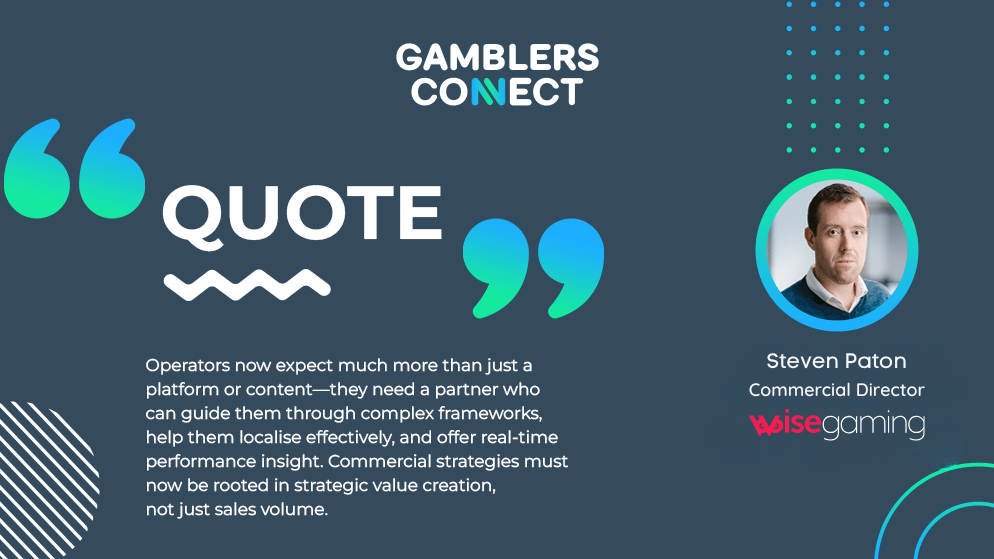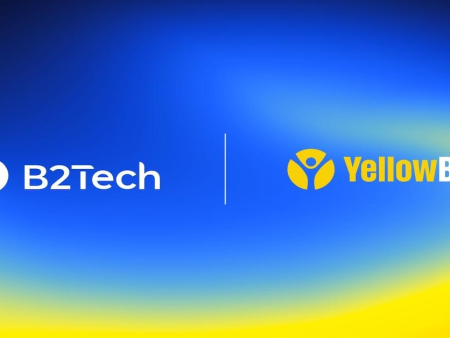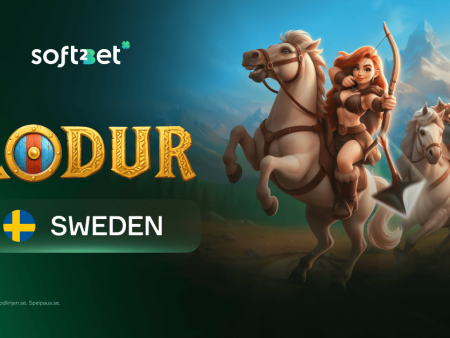
In the dynamic and ever-evolving iGaming industry, success hinges on a deep understanding of both the business and the player. Steven Paton, the Commercial Director and Senior iGaming Specialist at WiseGaming, brings a wealth of B2B and B2C expertise to the table. With a proven track record of driving commercial growth and a sharp eye for market trends, he has become a respected voice in the community.
Today, we sit down with Steven to discuss his strategic insights, the philosophy behind WiseGaming’s success, and his perspective on what lies ahead for the industry.
With over 15 years of experience in high-performance sales environments, what would you say has been the biggest shift in commercial strategy within the iGaming industry in the past five years?
Steven: The biggest shift has been the transition from a purely product-led approach to a solution-focused, data-driven strategy. Operators now expect much more than just a platform or content—they need a partner who can guide them through complex regulatory frameworks, help them localise effectively, and offer real-time performance insight. Commercial strategies must now be rooted in strategic value creation, not just sales volume—meaning deep market analysis, flexible commercial modelling, and scalable operational support have become central to success.
As someone who has worked across both B2B and B2C models, how do you approach adapting WiseGaming’s commercial strategies to suit different client needs and market segments?
Steven: It starts with listening. Every operator—whether B2B platform partner or B2C operator—has different goals, risk tolerance, and growth phases. We take a consultative approach: segmenting markets by maturity, regulation, and product demand, then aligning that to each client’s operating model. For newer operators, we offer agile white-label solutions and hands-on support. For established brands, we focus on performance optimisation, scalability, and market expansion. The goal is to match our flexibility with their ambition.
You’ve built a strong reputation for creative revenue generation — could you share an example of an unconventional strategy that delivered surprising results?
Steven: Certainly. One recent example involved repositioning a client’s CRM and bonus engine—not by increasing spend, but by restructuring player segmentation based on behavioural data and session timing. Instead of offering broader incentives, we built a leaner, more personalised retention flow. The result was a 17% uplift in reactivation revenue and significantly lower bonus costs. Sometimes, innovation isn’t about spending more—it’s about seeing the numbers differently and acting boldly.
What role does account management play in long-term client retention at WiseGaming, and how do you ensure your team balances growth with relationship-building?
Steven: Account management is critical to long-term success—it’s where trust, communication, and performance meet. At WiseGaming, we define clear KPIs for every account, but we also prioritise human connection. Our account managers are trained not just in upselling, but in understanding the operator’s roadmap and proactively identifying opportunities. It’s not just about renewals—it’s about evolving together. Growth happens naturally when relationships are built on shared outcomes.
Given your background in both iGaming and IT services, how do you see the convergence of technology and gaming evolving in the next few years?
Steven: The convergence is accelerating. We’re seeing increased use of AI for everything from fraud detection to personalised player journeys, as well as demand for modular, API-first platforms that can integrate faster and scale smarter. In parallel, operators are pushing for more real-time intelligence and automated operations. The future lies in platforms that blend traditional gaming tech with SaaS-level agility—something we’re heavily investing in at WiseGaming.
WiseGaming operates in a highly competitive and fast-moving space. What would you say is the company’s unique value proposition, and how do you help communicate that to partners?
Steven: Our unique edge lies in deep operator empathy—we’ve built and run casinos and sportsbooks ourselves, so we understand the pain points operators face daily. That insight shapes everything: from the way we structure partnerships, to how our platform is modular, localised, and quick to market. We don’t just sell tech—we deliver operational success. Communicating that is about showing—not telling—through tailored proposals, measurable roadmaps, and delivering early wins.
You’ve held leadership roles throughout your career — what’s your leadership philosophy, and how do you keep your teams motivated in a high-pressure environment?
Steven: I believe in clarity, trust, and autonomy. People thrive when they understand the mission, feel empowered to take ownership, and know they have the space to make decisions. I aim to create an environment where initiative is rewarded, support is consistent, and feedback flows both ways. I lead by example—staying visible, hands-on, and always available to problem-solve alongside the team. In high-pressure environments, motivation comes from a sense of progress and purpose. If people feel valued and trusted, performance and resilience naturally follow.
What are some of the key trends or innovations in the B2B iGaming space that you think operators should be paying more attention to right now?
Steven: Several come to mind. The first is the role of AI in retention and CRM automation, which is transforming how operators manage player lifecycles. Modular platform architecture has also given brands more control and scalability. Another key trend is the need to support alternative payment methods and regional PSPs to ensure there’s a clear path to global expansion. Lastly, real-time data visibility is vital for helping operators stand out in a highly competitive space — enabling faster, smarter, and more actionable insights. Ultimately, the operators that embrace tech-enabled agility and player-first thinking will be the ones who stay ahead.
From a commercial standpoint, how do you approach building partnerships that go beyond transactional value to become true collaborations?
Steven: It begins with shared vision and aligned incentives. I work hard to ensure our partners don’t just see us as a vendor—but as a strategic enabler. (And not the kind referenced in The World’s End—ours actually help, not invade.) We embed transparency into our commercial models, offer flexibility when needed, and ensure communication is constant. That includes business reviews, product roadmap alignment, and proactive support. Partnerships become collaborations when both sides are invested in each other’s success.
On a more personal note — after so many years driving growth in iGaming and tech, what keeps you passionate and energized about the industry today?
Steven: The pace and the people. iGaming is a rare mix of innovation, competition, and global culture—no two days are the same. I thrive on the challenge of unlocking growth where others see risk, and I genuinely enjoy helping teams and businesses scale. Plus, I love how tech continues to reshape the industry—there’s always something new to master. That constant evolution keeps me sharp and excited for what’s next.




